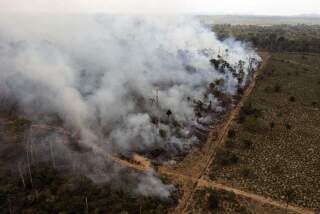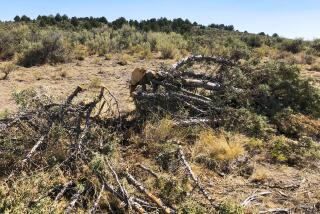Conservation groups challenge ‘green’ forest product certification
SEATTLE -- When an intense storm pounded southwestern Washington in 2007, mud poured down from the mountainsides, logging debris choked streams and the Chehalis River flooded much of the region, causing $57 million in damage.
Almost immediately, conservation groups, the Seattle Times and some academics laid partial blame on recent clear-cut logging in the hills around the region. Some hillsides had been largely denuded of trees, and landslides from the newly bared slopes choked surrounding creeks with silt and wood debris.
Weyerhaeuser Corp. has long insisted it was the intensity of the storm, not logging practices, that triggered the flooding.
The controversy was renewed again this week in a complaint filed Wednesday with the Federal Trade Commission alleging that timber companies were engaging in irresponsible harvest practices while claiming “green” certification for sustainability.
According to the conservation group ForestEthics, which filed the complaint along with Greenpeace, much of the logging conducted before the landslides along Stillman Creek in southwestern Washington was certified as environmentally friendly.
The certification, it said, came from the Sustainable Forestry Initiative, a stamp of approval that for years has been marketed to suggest that buyers of wood and wood products could rest assured that those products came from trees that were harvested with no lasting damage to the environment.
The complaint to the FTC, filed in Seattle by the Washington Forest Law Center, alleges that the Sustainable Forestry Initiative, or SFI, deceptively fails to make clear the extent of the timber industry’s role in developing the initiative’s logging standards. It urges the FTC to force the certification group to disclose to consumers that it receives substantial funding from the timber industry.
“Far from independent, SFI is in fact governed and financed by the biggest names in the logging industry, including Weyerhaeuser, Plum Creek and Rayonier,” the group said in a statement announcing the complaint. “SFI’s certification standards allow for the SFI label to be slapped on products that are sourced from destructive environmental practices, including the poisoning of communities and water with toxic chemicals, massive clear cuts, habitat destruction, erosion, landslides and stream sedimentation.”
The complaint highlights the increasingly confusing world of environmentally friendly labeling, which attempts to set guideposts for consumers spending up to $500 billion a year in the “green” marketplace.
The FTC in October revised its “green guides” to provide expanded guidance on industry claims about such issues as carbon offsets, what is truly biodegradable, and products allegedly made with renewable energy or materials.
In new requirements for certifications and seals, the commission emphasized that marketers must disclose any “material connection” such as a financial relationship that might affect the credibility of an endorsement.
The Sustainable Forestry Initiative has vigorously contested the conservation groups’ allegations, suggesting that the critics’ intent is to throw support behind a rival “green” certification organization, the Forest Stewardship Council, whose standards it says are not always more exacting.
Though Sustainable Forestry Initiative officials did not respond to requests for comment on Wednesday’s complaint, the organization said on its website that its governing board includes not just the timber industry, but an equally robust contingent of environmental and social groups.
Forestry practices get the SFI label only after undergoing rigorous, third-party audits, the organization said, based on strict standards on such issues as clear-cutting and the use of herbicides.
“It is unclear to us what ForestEthics’ goal is. We believe they are threatening companies that buy paper, wood and packaging products, and we know they are misrepresenting our program,” the organization said in a statement earlier this month.
“What large corporations in the supply chain understand is that we need more responsible forestry, not less. These corporations also understand that regardless of a company’s decision about which certification label to put on a product, the supply chain is mixed: SFI content is found in FSC-labeled products and vice versa. They see the value of both of our certification programs.”
SFI officials were referring to the second tier of ForestEthics’ campaign, an effort to convince large buyers of wood and paper goods to drop the SFI certification label from their products. A total of 24 companies, including Hewlett-Packard and Office Depot, emphasize purchase of FSC-certified paper when they can, rather than SFI.
Weyerhaeuser spokesman Anthony Chavez pointed to an internal scientific review of the 2007 storms that showed many landslides occurred unseen on unlogged land, and most were caused by the nearly unprecedented intensity of that year’s rains.
He also noted that a review of Weyerhaeuser’s pre-2007 logging practices by the Timber Procurement Assessment Committee in the Netherlands concluded there was “no conclusive evidence” that the high intensity of landslides could be attributed to the company.
The review, completed in March, found that Weyerhaeuser was in compliance with SFI standards in place at the time, and said there was not “sufficient evidence” to conclude there was a “systemic failure” in SFI’s certification system.
But conservationists say there are clear differences between forests logged based on SFI standards and those that have FSC certification.
In a recent flight over southwestern Washington with the Los Angeles Times, ForestEthics campaigner Aaron Sanger pointed out SFI-certified logging tracts that included dozens of acres of clear-cuts, with a couple of trees left standing in the middle of each acre. Logging extended all the way to the banks of some streams not known to bear salmon.
In nearby logging tracts certified by FSC, clearcuts featured substantial groves of trees left behind and buffers around streams.
“I remember my own shock in first seeing the difference between the two,” Sanger said.
Todd Paglia, Forest Ethics’ executive director, says the group hopes the FTC will force SFI to disclose financial backing from companies such as Weyerhaeuser, International Paper and Sierra Pacific.
“It is an unbelievably brash attempt at greenwash, completely funded and run by the industry that they’re supposed to be policing,” he said.
ALSO:
Accused Ft. Hood shooter wants to represent himself
Maine TV anchor on finding missing man: ‘That can’t be him’
George Zimmerman’s attorneys seek donations to pay legal bills
More to Read
Start your day right
Sign up for Essential California for news, features and recommendations from the L.A. Times and beyond in your inbox six days a week.
You may occasionally receive promotional content from the Los Angeles Times.






